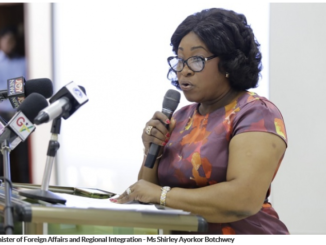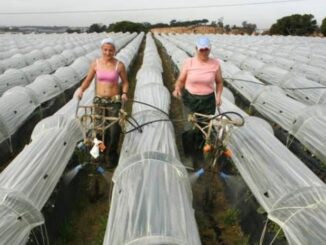
The God Child is an intriguing debut novel from a writer eager to address issues of cultural appropriation. Nana Oforiatta Ayim, a Ghanaian art historian and filmmaker undertaking the mammoth task of creating a pan-African Cultural Encyclopaedia in 54 volumes, one for each African country, is a busy woman whose star is clearly on the rise. This year saw her become the curator of the first Ghanaian Pavilion at the Venice Biennale, while also being appointed a TORCH Global South visiting fellow to Oxford University.
The appropriation of African art and artefacts is a main concern of The God Child, a coming-of-age tale that sees an immigrant Ghanaian teenager, Maya, explore her heritage and how her country’s story has been lost or stolen over centuries. From gender politics to life as a young black immigrant in Europe, the central themes are invigorated through rich characterisation and detail.
A lyrical prose style swoops the reader into its fold from the outset. Looking back on her formative years in Germany and England, and later in Ghana, Maya sets herself up as a witness to the transformation of her homeland from a narrative “too couched in arrogance and entitlement – to one of hard work, nobility, loyalty, fidelity. Though the clarity, the vision, the truth of it, was not yet apparent, it seemed a certain grace had set in, and that it was all of ours”.
The heart of the novel – as with contemporary authors Gabriella Ybarra and Zinzi Clemmons – is Maya’s relationship with her mother. There are echoes also of Jamaica Kincaid’s wonderful The Autobiography of My Mother, whose themes of loss, longing and identity feature prominently in The God Child. Maya is at once in awe of her beautiful, limelight-loving mother and also resentful of the latter’s constant need for attention. She admires the way her mother shimmers in society, “the glow trapped in the amber recesses of her skin”, while also wishing “that we did not have to flatten ourselves into her shadows to exist. And that once, just for once, she would be quiet”.
Power of words
Oforiatta Ayim writes brightly detailed scenes that show the pair’s fraught relationship and also offer a window into their culture. Maya gets her first weave while her mother swans around the hairdressers: “My braids were tight and heavy and my scalp felt like it was being pulled away from me by a ten-ton truck.” Elsewhere, her mother’s moods draw Maya’s attention to the power of words: “She only spoke Twi to me when she was throwing insults, and I wondered whether some languages were more projectile than others.”
This power of words and storytelling – and particularly the power of those who own the narrative – is a central focus, brought to life through the arrival of cousin Kojo from Ghana, an idealistic young man with big plans to reclaim his family and his country’s former glory. His background makes for interesting reading – “I grew up standing behind the Divine Drummer, Odumonkomakyerema Kwasi Pipim” – and their burgeoning friendship is moving and convincing as they bond over a shared desire to tell a new story for their people. Sadly, a move to England punctures the idealism. Good at sports, Maya is popular in school but knows she’s different from her peers: “They could all afford to play the fool, because it was still the muted portraits of their ancestors that lined the oak-panelled walls of the great hall.” Kojo, meanwhile, endures overt racism in a brutal attack from a teacher: “‘Run, you bloody wog. Run.’ And Kojo knew he was not allowed to say that, the ‘bloody’ or the ‘wog’, but he was not one to point it out.”
Vibrant in its themes, prose and characterisation, structurally the book does not fare as well. Timelines are messy, switches in setting in later parts clunky, and the action that takes place in Ghana towards the end of the novel is rushed and melodramatic. The closing chapters in particular feel thinly sketched – a random few pages in Norway, then an altercation about cultural appropriation with academics back in Britain.



